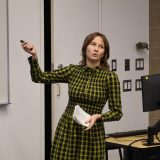Political Science Professor Studies Energy Policy in Azerbaijan
July 21, 2014
Baku, Azerbaijan, is the site of the world’s first oil well, and it sits between the Caucuses and the shore of the Caspian Sea. For David Shafie, associate professor of Political Science, it is an ideal place to study the relationship between energy and the environment. During the Middle Ages, oil from Baku was shipped by caravan along the Silk Road to light lamps in every corner of the known world. By 1900, Baku produced half of the world’s oil, and its engineers pioneered the technology of offshore drilling after World War Two.
Today, the ecologically-sensitive Caspian Sea is threatened by a new oil boom. Following independence from the USSR, there was an influx of international investment to develop new oil and gas fields beneath the sea bed. Recently, construction began on a pipeline to deliver natural gas from Baku to Greece and Italy, helping Europe bypass the volatile Russia-Ukraine transit network. This rush of development is occurring as the country deals with the toxic legacy of Soviet rule; the northern Azeri petrochemical center of Sumgayit was recently named the world’s most polluted city. At the same time, the country is looking toward the future by investing in renewable energy sources. The city of Baku generates nearly half of its electricity from municipal waste incineration, and new wind and solar farms in this windy and sunny country promise to free up more petroleum for export.
Shafie is participating in a two-week workshop on Energy at the Caspian Center for Energy and Environment in Baku. Along with a group of researchers, government officials and business leaders from 20 different countries, he is discussing topics ranging from energy security, economics and law, to international energy politics, resource management, and climate adaptation. He plans to develop a new course in Global Energy Politics after returning to Chapman this fall.


